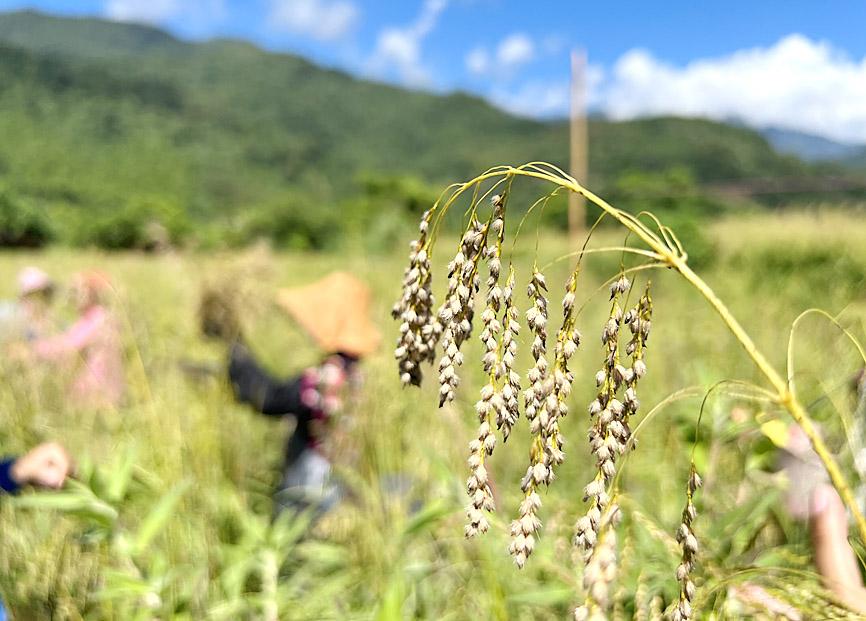The government should promote the growth of Taiwanese oil millet, as the perennial grass is highly tolerant to drought and saline soil, sustainable development groups said on Thursday.
The crop is also flood-tolerant, the groups said, adding that rice could be replaced with oil millet during water shortages to help conservation efforts.
The plant used to be a staple of the Bunun people, before vanishing for half a century following the relocation of the Bunun after the 1941 Pasnanavan incident in Taitung County.

Photo: CNA
The Pasnanavan incident refers to a failed attempt by relocated Bunun to return to their mountain homes by attacking police stations of the then-Japanese colonial government.
The incident only steeled the decision of Japanese authorities in the region to complete the relocation of the Bunun of Pasnanavan to the plains.
The plant, which a young Bunun named Chiu Hsiao-cheng (邱曉徵) and his father reintroduced as a crop five years ago, was sent to Academia Sinica for analysis.
The crop was said to have the potential to be a staple, given the effects of climate change.
Moreover, oil millet had survived after being under water for four days during flooding in 2019, Chiu said.
Climate change has affected the distribution of water resources, said Ling Keng-hung (林耿弘), president of Taitung County’s Youth and Elderly Community Co-creation and Environment Protection Association.
With its high concentration of rice paddies, the first crop of each growing season in the upper fields of the Huadong Valley — the area between the Central Mountain Range and the Coastal Mountain Range, also known as the Hualien-Taitung Valley (花東縱谷) or the East Rift Valley — could be for growing oil millet or similar crops that have high economic value and do not need as much water, Ling said, adding that this would improve the conservation of water resources.
Huang Tzu-yun (黃子芸), an assistant researcher at the Taitung District Agricultural Research and Extension Station, said that the station is studying how to promote oil millet as a crop, as it has high nutritional value and is adaptable to climate change.
Academia Sinica Institute of Plant and Microbial Biology assistant researcher Hsu Tzu-fu (徐子富) said that during the most severe water shortage in half a century last year, oil millet was less affected than other crops that rely on copious amounts of water.
A perennial plant, oil millet can be harvested by scything it above the roots, with no need to reseed, Hsu said, adding that tilling is only required every three years.
Compared with rice paddies or wheat fields, which need to be tilled every 100 to 120 days, and six months respectively, oil millet fields have a much better carbon fixation rate, he said.
“We hope to work with US and Japanese academics and make a proposal to UNESCO to have oil millet considered a world cultural heritage,” he said.
“We hope that Taiwan could contribute, in some form, to help resolve potential global food supply crises,” he said.

DEFENSE: The National Security Bureau promised to expand communication and intelligence cooperation with global partners and enhance its strategic analytical skills China has not only increased military exercises and “gray zone” tactics against Taiwan this year, but also continues to recruit military personnel for espionage, the National Security Bureau (NSB) said yesterday in a report to the Legislative Yuan. The bureau submitted the report ahead of NSB Director-General Tsai Ming-yen’s (蔡明彥) appearance before the Foreign and National Defense Committee today. Last year, the Chinese People’s Liberation Army (PLA) conducted “Joint Sword-2024A and B” military exercises targeting Taiwan and carried out 40 combat readiness patrols, the bureau said. In addition, Chinese military aircraft entered Taiwan’s airspace 3,070 times last year, up about

The Overseas Community Affairs Council (OCAC) yesterday announced a fundraising campaign to support survivors of the magnitude 7.7 earthquake that struck Myanmar on March 28, with two prayer events scheduled in Taipei and Taichung later this week. “While initial rescue operations have concluded [in Myanmar], many survivors are now facing increasingly difficult living conditions,” OCAC Minister Hsu Chia-ching (徐佳青) told a news conference in Taipei. The fundraising campaign, which runs through May 31, is focused on supporting the reconstruction of damaged overseas compatriot schools, assisting students from Myanmar in Taiwan, and providing essential items, such as drinking water, food and medical supplies,

A magnitude 4.3 earthquake struck eastern Taiwan's Hualien County at 8:31am today, according to the Central Weather Administration (CWA). The epicenter of the temblor was located in Hualien County, about 70.3 kilometers south southwest of Hualien County Hall, at a depth of 23.2km, according to the administration. There were no immediate reports of damage resulting from the quake. The earthquake's intensity, which gauges the actual effect of a temblor, was highest in Taitung County, where it measured 3 on Taiwan's 7-tier intensity scale. The quake also measured an intensity of 2 in Hualien and Nantou counties, the CWA said.

STRICTER ENFORCEMENT: Taipei authorities warned against drunk cycling after a sharp rise in riding under the influence, urging greater public awareness of its illegality Taipei authorities have issued a public warning urging people not to ride bicycles after consuming alcohol, following a sharp rise in riding under the influence (DUI) cases involving bicycles. Five hundred and seven people were charged with DUI last year while riding YouBikes, personal bicycles, or other self-propelled two-wheelers — a fourfold increase from the previous year, data released by the Taipei Police Department’s Traffic Division showed. Of these, 33 cases were considered severe enough to be prosecuted under “offenses against public safety,” the data showed. Under the Road Traffic Management and Penalty Act (道路交通管理處罰條例), bicycles — including YouBikes and other